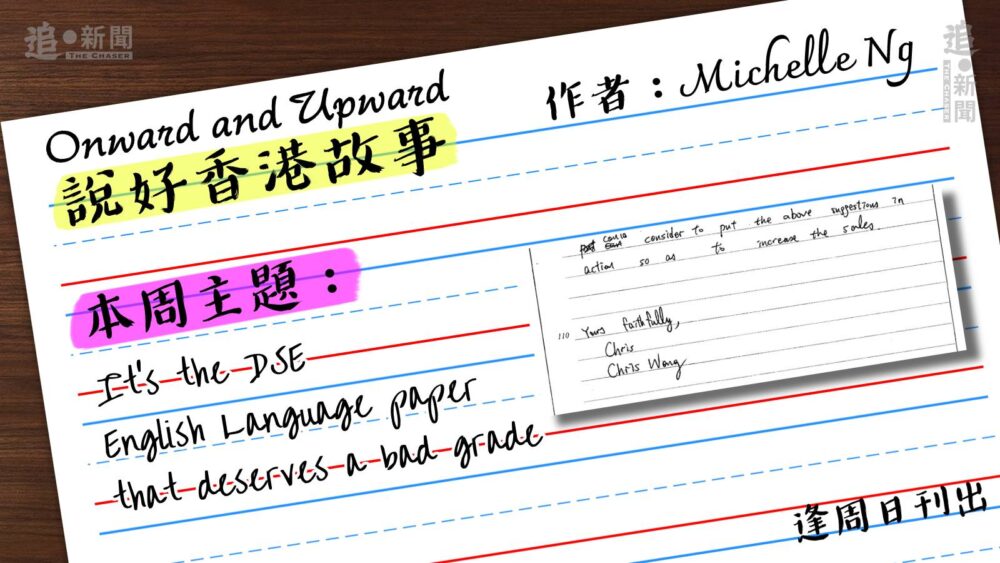
Recently, a Hong Kong parent reached out to me. My child has to sit for her DSE in a few weeks, she said. Can you help her tackle the writing section of her English Language paper on short notice?
Even though I’m a writing coach, I’m probably the worst person to turn to if it’s only the exam kind of writing that a student wants to learn. Among the factors that block me from becoming a helpful exam coach are, I simply can’t empathize with students who find English exams difficult. Back in the days when I was a student, I could always get an A for English in public exams, despite not having been prepped for them in any way. My only “secret” was I was well-read, pure and simple: I was able to do those exam questions with my eyes closed, just by relying on the rich fund of knowledge stored in my head, the (unintended) outcome of having spent countless happy hours reading on my own in the library.
報道無罪 知情有價 請即訂閱《追新聞》:
https://www.patreon.com/thechasernews
So, rightly or wrongly, my view towards exam-taking has always been if students are well-trained in reading, everything will naturally fall into place. They’ll be able to do real writing (the kind of writing I teach), but they’ll also be able to sail through the composition segment of English exams, just as I’d done when I was a student. And because their lives only truly begin after they leave school, the real payback of being able to read and write properly comes not when they score high in exams, but later in life, when they have to conceive of their ideas in words and sell those ideas to bosses and clients. If you think of the sheer number of adults in Hong Kong who tremble at the thought of having to write a business proposal or cover letter in English, you can have some idea of the extent to which the city’s English education has ill-prepared them for real life.
In any case, that parent’s request got me thinking: what is it about real writing that’s so different from exam writing? Hemingway once said “the only kind of writing is rewriting” – well, this pretty much sums up what real writing involves. To show you the difference rewriting makes, below is the first draft of a recent piece I wrote (only the introduction is included); further below is the final version, completed after two rounds of rewriting:
FIRST DRAFT
When Leonardo arrived in Milan as an unknown young painter, he brought with him a lute which he designed himself – it was shaped like a horse’s head. He knew he had to gain entry into aristocratic circles before he could get commissions; so, to attract notice, he performed on his peculiar-looking instrument. The Milanese were intrigued, and he promptly landed on his first patron.
Leonardo’s example provided me with just the solution to solve a dilemma: I was working in mainland as a young woman and had to strike a balance between expanding my network through banquet attendance and drawing my boundaries. And because I wouldn’t drink – I wanted to maintain my vigilance at all times – I needed to find a way to soften the blow when I declined alcohol. My Leonardo-inspired solution: I offered to play the guzheng (the Chinese harp), an instrument I was proficient in. Because at the time, my mainland peers didn’t grow up learning instruments, my playing was a rare sight and therefore of value. Thanks to my cunning, I managed to avoid falling into compromising situations.
My first draft – I spent around 15 minutes on it – isn’t good writing by any stretch of imagination (though it should be good enough for a DSE examiner). My focus was solely on getting the thoughts in my head on paper. I didn’t put myself in my reader’s shoes and consider whether my narration of events had been presented in the most reader-friendly order. Nor did I consider whether I’d supplied all the necessary information to my reader, so that she could envision the picture in my head.
It took me another 45 minutes (two rounds of rewriting) to accomplish these two aims.
FINAL VERSION
When Leonardo da Vinci arrived in Milan as an unknown young painter, he brought along with him one of his designs – a lute shaped like a horse’s head. He knew in order to find patrons, he must first gain entry into aristocratic circles; to attract notice, he sought to bring down the house by playing his unusual instrument. His ploy worked. Before long, the Milanese, smitten by his bold imagination and delicacy of sensibilities, began sending commissions his way.
It was Leonardo’s example that I turned to when I ventured to work in mainland as a lone young woman and was soon faced with a dilemma: in a society motored by guanxi – an otherwise intractable problem can be solved in an instant after dialing the number of the right person – how can I get to be in the good graces of people whose help I might need in the future, while at the same time signaling to them that I have my boundaries, lest they assume I was so naive that they could easily entrap me in compromising circumstances?
My musical abilities were nowhere near Leonardo’s level, but I was a proficient player of the guzheng (Chinese harp), having honed my skills years ago at the children’s division of the Academy of Performing Arts. So, taking cue from Leonardo, I offered to play at banquets. Most of my mainland peers didn’t take up instruments as children, so the sight of a young female playing at near-professional level was a rarity. The added bonus was, my contribution to the festive atmosphere meant I’d more or less earned the right to decline alcohol. This allowed me to be alert at all times, so no one could take advantage of me.
Compare my first draft to my final one, and you can see the limitations of an exam-oriented approach to instilling writing skills. My first draft could easily have gotten the top grade at DSE, yet a student working at this level still has a long way to go if she is to be an effective communicator in life.
The reality is, good writing takes time. I devoted a good hour to producing those 288 words in my final draft. It took me time to fill in the details, sort out the logic of my story, try out different ways of expressing the same content – “before long, the Milanese, smitten by Leonardo’s bold imagination and delicacy of sensibilities, began sending commissions his way” is much better than “the Milanese were intrigued, and Leonardo promptly landed on his first patron.”
The thing is, to learn real English writing, a student must be given time. The more time she has, the more motivated she is to experiment, and the more attuned she is to the expressive potential of English. DSE’s own marking guidelines warn candidates against preparing for the writing section of the English paper by “spending time memorising stock phrases.” The irony is, the time pressure of an exam setting – candidates have to churn out a total of 600 words in two hours – encourages students to do just that!
Michelle Ng
英國牛津大學畢業,前《蘋果日報》和《眾新聞》專欄作家,現在身在楓葉國,心繫中國大陸和香港。
聯絡方式: michelleng.coach@proton.me
個人網站: https://michellengwritings.com
逢周日英國時間晚上8時 / 周一香港時間凌晨4時刊出
《追新聞》無金主,只有您!為訂戶提供驚喜優惠,好讓大家支持本平台,再撐埋黃店。香港訂戶可分享給英國親友使用。



